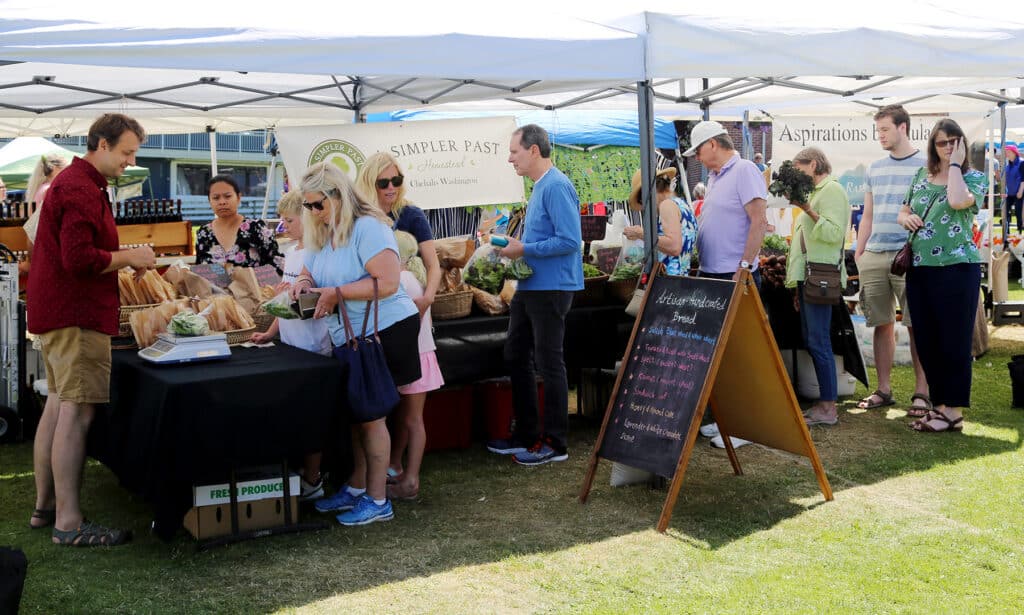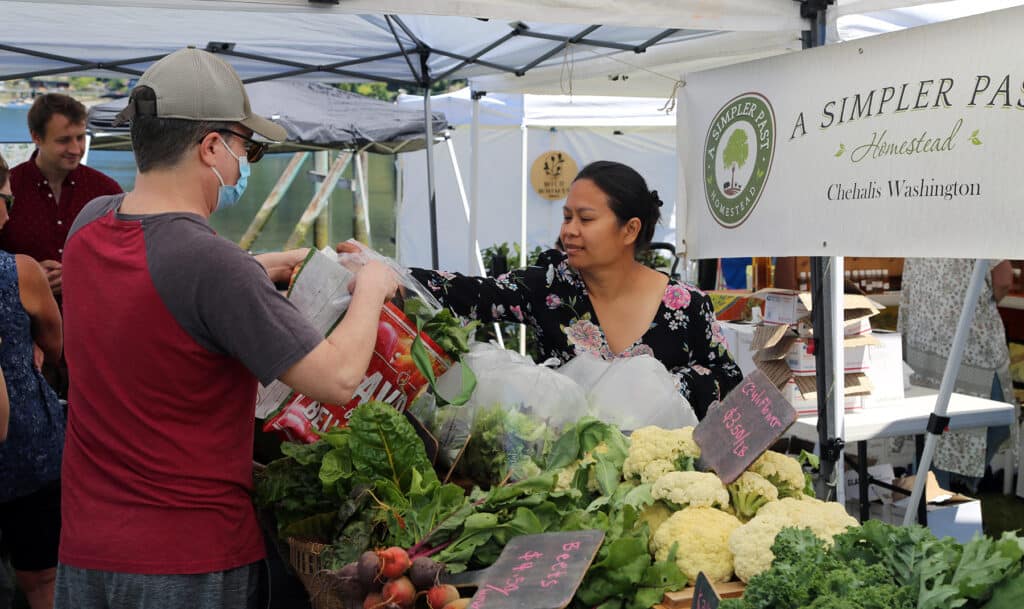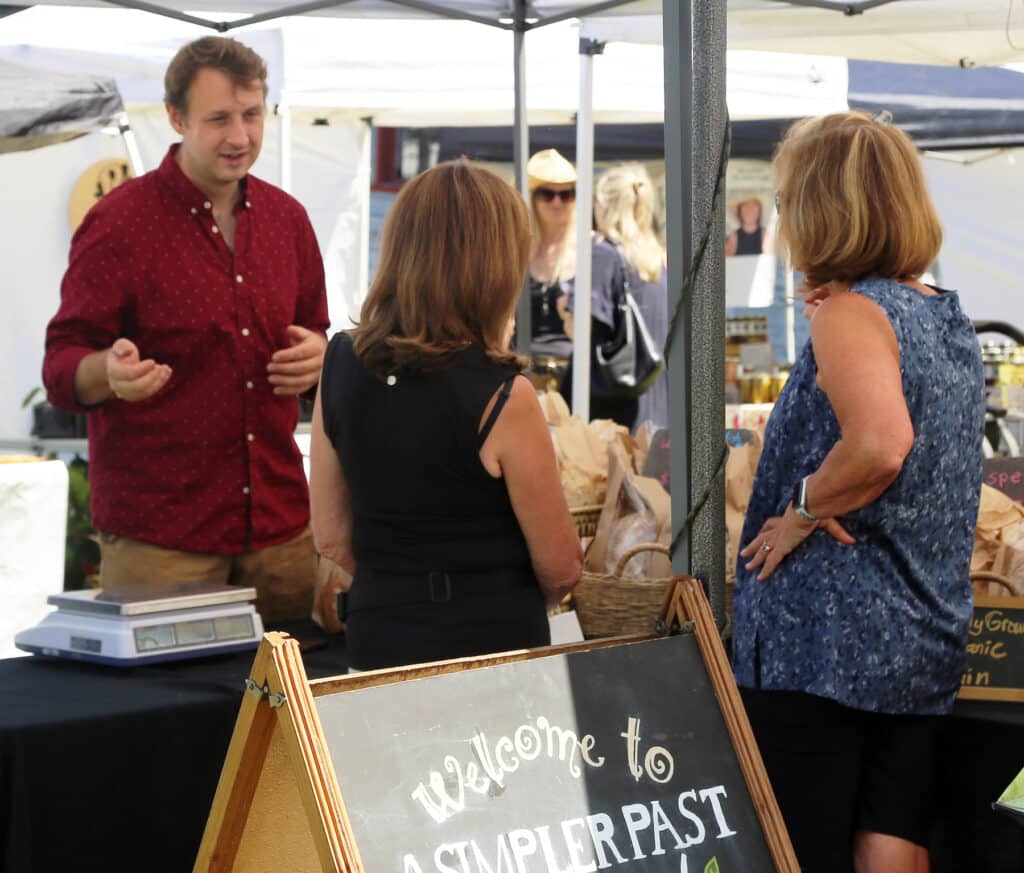Business Community
Business Spotlight: Farmer’s Market vendor evokes a Simpler Past
It’s easy to find A Simpler Past’s booth at the Waterfront Farmers Market on Thursday afternoons in the summertime. It’s the one with the long line of customers avidly eying the artfully jumbled displays of fresh produce and home-baked breads and cakes at the end of a long row of vendors’ booths.
Like many vendors at the market in Skansie Brothers Park, A Simpler Past is a true mom-and-pop outfit. It is owned and operated by husband and wife Derek and June Noble. The couple, parents of two young sons, forged a work/life balance on their 20-acre property outside Chehalis in Lewis County.
And, like most of the 40 or so vendors of food, drinks, crafts, flowers, and lotions at the farmers market, the Nobles commute to work in Gig Harbor — in their case, on a seasonal basis.

A Simpler Past routinely draws long lines at the Gig Harbor Waterfront Farmer’s Market. Derek and June Noble, the owners of the farm near Chehalis, are at left. Vince Dice
The history of Simpler Past
To hear them tell it, neither one started out as a farmer, but came to it gradually.
“I grew up in Bellevue,’’ Derek says. “I went into the Army after 9/11. I went to culinary school before the Army and thought I would go into the restaurant business.’’
The couple met in Thailand, June’s home country. When Derek came home to Washington, now with June, he thought he’d still be in food but not in restaurants. “I was looking for a home-based business,’’ he recalls, “and I was into health-giving food. I thought growing food would be more healing.’’
Thus the seeds of A Simpler Past Homestead — the venture’s full name — were sown.
Fittingly, A Simpler Past started simply. June suggested they plant a kitchen garden at home. They did, and it proved inspirational. At first, they grew food just to feed themselves. They found it tastier, fresher and more healthful than mainstream supermarket fare.
“It started with harvesting,’’ she remembers. “It’s just a very different taste. You can tell right away.’’
“Then we thought, why don’t we do this as a business?’’
The road to full-time farming
At the time, both had unrelated outside jobs. June was a server in a Thai restaurant. Derek was employed at Boeing and the couple lived in Grant, Mason County.
Derek remembers it this way: “Seven years ago, I was working as a machinist for Boeing, They decided to move my job to Seattle. I decided to leave Boeing. So, we sold our home in Grant,’’ moved to the country near Chehalis and put down roots there.
A Simpler Past’s first move as a micro-business was selling their goods at the Chehalis farmers market. They liked the market, but thought they should go farther afield to grow their business.
“We had friends in Gig Harbor,’’ Derek says. “We visited them on a Thursday, went to the farmers market downtown, and thought “Wow, they don’t have anybody selling local produce.’’
The Nobles applied for a vendor’s slot in Gig Harbor and got it. That was five years ago.

June Noble helps a customer at A Simpler Past Homestead’s booth at the Gig Harbor Waterfront Farmer’s Market earlier in July. Vince Dice
Simpler Past selling only in Gig Harbor this year
Nowadays, June, Derek and their boys live near the end of the Newaukum Valley, east of Chehalis. On market day, they fill a small trailer with foodstuffs for sale and drive to the Waterfront Farmers Market 90 minutes away.
“This year, things started slowly,’’ June observes. “There weren’t as many vendors.’’
Customers, too, were fewer. That was a potential problem, as the Nobles are selling solely in the Gig Harbor market this year rather than doubling up with Chehalis, as they did last year.
The Nobles sell nearly everything they produce, save for the food they eat themselves. They have a few direct sales to individuals but don’t operate on a large enough scale to sell food to groceries and supermarkets. Farmers markets account for most of their business.
The weather was a factor in this year’s slow start, Derek points out. “It was a colder, wetter spring. We were really lucky. We planted later in spring and we diversified our greenhouses.’’
Homestead in the Newaukum Valley
The Nobles’ 20-acre spread includes greenhouses, a wellhead and outdoor raised beds, 50-feet long and three-feet wide. “We can grow as many as three crops in the beds at the same time,’’ Derek remarks.
Cauliflower, cabbage, broccoli, radishes, carrots, beets, snap peas, bagged mixed lettuces and other greens, eggplants, and tomatoes help round out the produce menu.
The Nobles practice permaculture, growing chemical-free, hand-tended produce on two-thirds of an acre. They live on the property, too. This differentiates them from full-on farmers, who work many more acres and don’t live on land they farm. It explains the “Homestead’ in their business name, too.

Derek Noble talks to a customer at A Simpler Past’s booth at the Waterfront Farmer’s Market in July 2022. Vince Dice
A Simpler Past evokes nostalgia for bygone days, joined to a conviction that the old ways have value. It also implies a kinship with the back to the land movement of the late 1960s and ’70s and its regard for the natural world. The Nobles forego having a large tractor, letting the biological properties of the land to do their thing, and earthworms to help aerate the soil.
The Nobles craft some of their most popular items in their home kitchen: baked goods. “The baking was her idea,’’ Derek says of June.
Both partners bake, with Derek concentrating on bread. Fast-selling breads and toothsome small, sweet cakes are one reason for the long lines at their market booth.
The Nobles, like many mom and pop enterprises, do most of the work themselves. Last year, a friend’s teenage son helped out in busy times by weeding and harvesting vegetables.
Why Gig Harbor?
Volunteers at the Waterfront Farmers Market pitch in, too. “We really like the Downtown Waterfront Alliance,’’ Derek says of the nonprofit that runs the market and recruits and schedules volunteers. Volunteers help set up the booth and load up any unsold items in the trailer at closing time.
A Simpler Past, like other vendors, pays the Alliance for space and a booth. “It’s very reasonable,’’ says June, adding, “We usually pay by the week. In Gig Harbor it runs $50 to $60.’’
Now, at mid-summer, the season’s slow start is over. Indeed, the farmers market is booming, with more vendors and more customers. There is a little softness, due to inflation.
“We’re selling more this year,’’ Derek notes. “But I don’t see as many big-ticket sales. The average customer spends $20. Sometimes you’d see someone go over $50, but there’s less of that now.’’
Supply chain disruptions plague the broader economy.
“Big Ag seems to be having more and more issues with supply chains. They use resources that come from far away. I think we had trouble getting white flour for bread, but other than that, we’ve felt almost no effects,’’ Derek declares.
He credits homestead farming’s localism for that: “We’re a high-labor farm. We’re a low-input farm.’’
Gig Harbor Waterfront Farmer’s Market
When: 1 to 7 p.m. Thursdays through Aug. 25, 1 to 6 p.m. Sept. 1 and Sept. 8
Where: Skansie Brothers Park in downtown Gig Harbor
